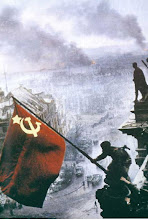 I would like to alert all readers of this blog to an unprecedented act of historical vandalism being prepared by the administration in the Polish city of Poznan.
I would like to alert all readers of this blog to an unprecedented act of historical vandalism being prepared by the administration in the Polish city of Poznan.Two weeks ago the councillors of Poznan decided to rid the town of the statue erected to commemorate the internationalism of General Karol Swierczewski. There is a simple reason - this General was a veteran of the International Brigades in Spain.Admittedly it is not the most beautiful of monuments, but it is the suppression of any memorial to the many Polish people who fought and died fighting fascism in Spain that I object to most strongly
The ruling centre-right Citizens Platform (PO) with the support of the rightist Law and Justice party, both essentially right wing parties, see the historic role of the International Brigades not as the first real challenge to the rise of fascism in Europe but rather as an expression of communist iniquity, and anything which places communists in the context of their undoubtedly heroic role in combatting fascism in Europe is loathed and feared.
But historical truth must prevail. Karol Swierczewski was born in 1897 in Warsaw, into a poor working class family. From the age of 12 he worked in a Warsaw factory. During the First World War, he was evacuated to Moscow. In 1918 he joined the Bolshevik Party and fought in the Russian Civil War as a soldier of the Red Army
During the Spanish Civil War, under the nom de guerre of General Walter, he commanded the XIV International Brigade, and later the 35th International Division. It is widely believed that Swierczewski/Walter was the inspiration for the figure of General Golz in Ernest Hemingway's 'For Whom the Bell Tolls'.

General Walter's (pictured right) estate was donated to the Association of Friends of the International Brigades. Last year, the University of Valencia exhibited 63, never before seen, images, selected from the 333 that make up the Swierczewski's/Walter archive.The case has been taken up, by the Polish Citizens’ Movement for the Defence of Monuments and Traditions of the Left, (CMDTL) with the Vice President of the European Parliament, Sr. Miguel Angel Martinez, who was jailed under Franco.
The CMDMTL struggle is very difficult in the present climate and needs international solidarity to help it prevent this act of political vandalism from taking place; such acts should have no place in modern Europe, which should cherish the heritage of anti-fascism not obliterate it
Direct representations be made to the following:
The President of Poznan and his deputies:Mr Ryszard Grobelny, President, Mr Tomasz Jerzy Kayser, Mr Miroslaw Kruszynski, Mr Jerzy Stepien,Mr Maciej Frankiewicz
at:prezydent@um.poznan.pl
Also let your feelings known to the Poznan City Hall press officer, Ms Anna Szpytko
at:rzecznik@um.poznan.pl...The Polish Embassy in Dublin- ambassador@dublin.polemb.net
OR if you are a British based reader.... polishembassy@polishembassy.org.uk
Ironically the removal of the Monument would cost 70,000 euros at a time when the Poznan Town Hall has decided to reduce the social spending budget by 21,000 euros.





